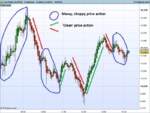I was hearing an interview with psychologist Brett Steenbarger and it was an eye opener.
Trading is extremely hard and it has to be. ¿Why to make the hard job of create business, hire people and deal with customers if trading was easier?
The great difficulty in trading is to find an objective edge in the markets. And yes you need the psychology to maximize the profits from your edge and money management to not blow up and compound, etc.
But without an edge all that is worthless.
Not having an edge also creates psychological troubles.
That's why internet marketers sell psychology courses, because that's easier than find an edge in markets.
Another point is that markets evolve with the time and you can lose your edge at any moment. So you need to innovate and adjust to new market conditions. Or find new markets.
Trading is extremely hard and it has to be. ¿Why to make the hard job of create business, hire people and deal with customers if trading was easier?
The great difficulty in trading is to find an objective edge in the markets. And yes you need the psychology to maximize the profits from your edge and money management to not blow up and compound, etc.
But without an edge all that is worthless.
Not having an edge also creates psychological troubles.
That's why internet marketers sell psychology courses, because that's easier than find an edge in markets.
Another point is that markets evolve with the time and you can lose your edge at any moment. So you need to innovate and adjust to new market conditions. Or find new markets.

